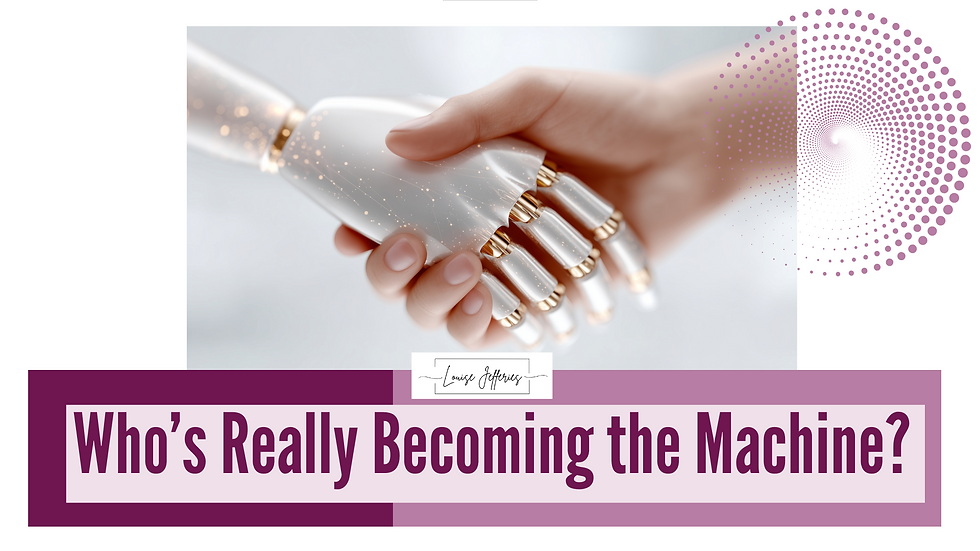Are we becoming more machine than human?
- jefferiesart
- Aug 10, 2025
- 4 min read

As a child, I hated crying. Not just the act of it, but even the idea of it. Reading the word in a book or seeing someone cry on screen made me squirm with discomfort.
Over time, I became very good at hiding my emotions. I learned to stay calm in public, to hold it all in until I was alone in a ‘safe’ place. And for years, I believed that was strength.
Even during the early, turbulent years of perimenopause, when hormones wreaked havoc, I kept it together on the outside. Friends and family had no idea what was going on.
Looking back, I wonder whether this really served me.
Did it help me grow into a stronger, more rounded person? Not really.
Did it help others feel safe to express themselves? Not at all.
Did it help society move towards accepting and embracing what it means to be human? Absolutely not.
Instead, it reinforced the silent, unspoken belief that showing feelings at work, or even at home, is weak, unprofessional and undesirable.
And it’s this belief I see reflected in so many of the people I work with.
They fear being “too emotional” in meetings. Not sobbing or shouting, necessarily, just showing passion, voicing frustration, expressing themselves fully.
They worry they’ll be judged, labelled, overlooked.
And they’re not wrong to worry.
We still live in a world where women who speak with conviction are often labelled “too emotional” or even “crazy.” A woman who raises her voice risks being seen as irrational, incapable of logical thought, as if anger or frustration negates her competence.
Men, too, carry the weight of stereotypes. “Real men don’t cry.” Men who express vulnerability are often ridiculed, as though feelings make them less capable, less dependable.
We have created workplaces and societies that reward stoicism and penalise humanity.
We’re expected to show just enough emotion to seem relatable, but not so much that it becomes “inconvenient” for others... it's a fine line.
Interestingly, while we humans are busy suppressing our emotions in the name of professionalism, artificial intelligence is becoming more human.
We regularly hear feedback that AI tools are more patient, more polite, more attentive than many humans are. They listen without judgement, respond thoughtfully, and never lose their temper.
It makes me wonder: as AI becomes more human, are we becoming more machine-like?
When Is It Okay to Show Emotion?
There’s no doubt that emotions have a place and a power at work.
Passion inspires others and signals commitment. Calm, quiet confidence builds trust. Even anger, when expressed constructively, can spotlight injustice or urgent problems that others prefer to ignore.
But there’s also a line. Too much emotion; shouting, sobbing uncontrollably, or venting frustration without purpose, can unsettle others and damage credibility.
That doesn’t mean we must swing to the opposite extreme and become robotic. The key lies in emotional intelligence; recognising and regulating our feelings, not denying them.
It’s not about being less human, it’s about being fully human in a way that helps rather than harms.
One of the most powerful ways to model healthy emotion at work? The simple act of admitting when you’re wrong.
It takes courage to say, “I was mistaken,” or “I overreacted.”
It shows humility, integrity, and strength.
Apologising, without over-explaining or over-apologising, is a hallmark of someone who’s secure enough to take responsibility. It often disarms conflict and rebuilds trust faster than pretending nothing happened.
Why Is This So Hard?
Part of the difficulty lies in the cultural narratives we’ve inherited.
For women: be warm, but not too emotional; strong, but not aggressive; speak up, but don’t dominate.
For men: be assertive, but never vulnerable; lead, but don’t reveal doubt; win, but never cry.
These double standards leave little room for authentic expression. They make it hard to find the balance between honesty and composure.
And, of course, there are those rare people who use others’ emotions against them. These individuals, often struggling with their own issues, see vulnerability as weakness and exploit it to gain power.
So it’s no wonder that so many of us feel safer retreating behind a mask of neutrality.
But that safety comes at a cost.
When we suppress what makes us human, we also suppress what makes us memorable, trustworthy, and inspiring.
Moving Forward
There cannot, and should not, be emotional free-for-alls at work. But we also shouldn’t aspire to be machines.
We can:
Acknowledge emotions without letting them drive the bus.
Express feelings constructively using “I” statements, focusing on impact, proposing solutions.
Pause when overwhelmed, rather than lashing out or shutting down.
Admit when we’re wrong or when we’ve misjudged a situation.
Leaders can help by modelling these behaviours themselves, creating environments where people feel safe to speak up, even when emotions run high.
We don’t need to fear our emotions, we just need to learn to work with them.
And when we do, we create workplaces where humanity, not just productivity, thrives.
So here’s my question to you:
What helps you find the balance between being authentic and being professional?
When have you seen emotion handled well, or badly at work?
I’d love to hear your thoughts



Comments